Health Minister Greg Hunt’s life shaped by extraordinary childhood
Federal Health Minister Greg Hunt, the man charged with leading the nation’s response to COVID-19, has shared the astonishing untold story of his childhood, opening up on the demons that shook his early years.
QLD News
Don't miss out on the headlines from QLD News. Followed categories will be added to My News.
The little boy’s heart is beating so fast, it’s almost exploding in his chest.
His mum is chasing him around the kitchen table with a carving knife.
There’s no glint of murder in her eyes but he doesn’t want to stop and test his luck.
The young boy whips out of harms way, but it won’t be until years later that he realises his mother is not like other mothers. Later, she would be sent to an “asylum” for serious, erratic behaviour.
“It felt like something straight out of One Flew Over the Cuckoo’s Nest,’’ Greg Hunt said, describing his visit to the institution.
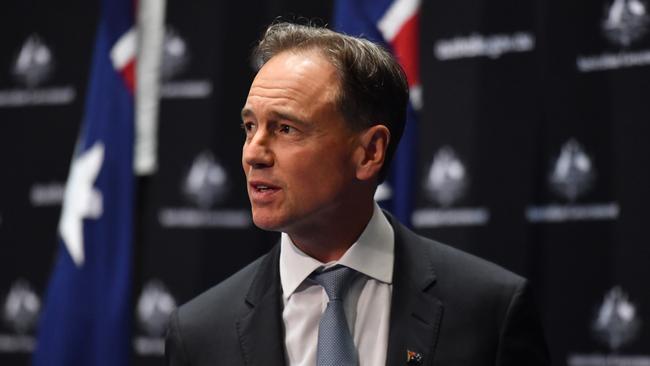
The boy is now Australia’s Federal Health Minister and charged with leading the fight to stop COVID-19. Today he reveals his extraordinary and tumultuous childhood for the first time.
For kids who have a parent with a deep and disturbing mental illness, an unpredictable life is their sense of normal. They love their parents with all their heart and go out of their way to help them.
So at seven years old, only-child Hunt would try to fix the mood of his bipolar mother, Kathinka, by making her a cup of tea, or getting her to play cricket with him.
Anything that made her happy before, he would try again.
HAUNTED BUT LOVING
For a politician whose childhood was full of “quirks”, Hunt, married and father of two, is strangely boring.
But how can that be given his mother would go off and do courses like walking on hot coals? Or one day, after Hunt had finished high school, decided she would drive from Melbourne to Queensland and never come home?
Hunt, 54, is philosophical and grateful for his childhood.
Kathinka, an intelligent woman, provided routine, albeit to the rhythm of a rollercoaster. She would wear her emotions on the outside, and during her highs would wrap herself in colourful, bold hues.
As her mania took hold, becoming more challenging as she got older. Kathinka would become the life of the party, incessantly talk and do the strangest things. But at some point, the morose mood would steal her away from her son and she would lock herself in her room, in the dark, sometimes for days. She had chronic pain, which she would treat with a “liberal use of alcohol”.
Of German-Scottish extraction but Australian-born mother, Tinka, as she was affectionately called by friends and family, was a nurse before Hunt was born, and while she may have been haunted at times, she loved her boy. “When there was a problem”, Hunt, academically gifted, would distract himself.
For hours he would bowl his cricket ball at a single stump at their Victorian home. Over and over and over – the crack of the ball soothing for a boy, who adored his mother and spent lots of time with her, especially in his younger years.
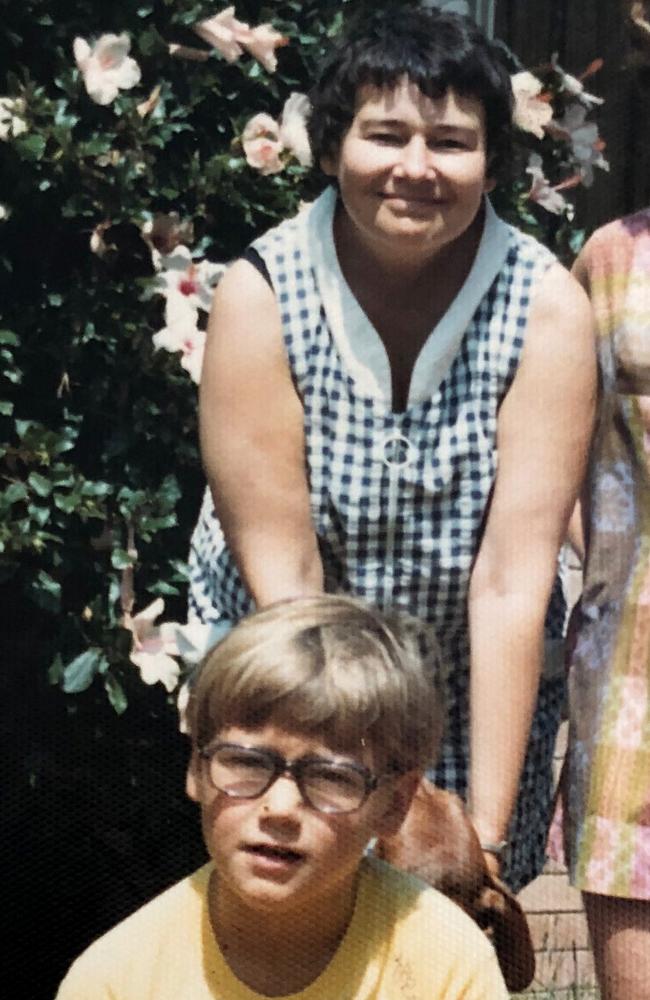
But he loved it when his father, Alan Hunt, his influential politician father, would come home.
When in the door, Hunt Senior, a champion axe man, amateur ornithologist and a man good at holding his whisky, would spend hours talking to his son.
They would natter about life – not about Kathinka’s eccentric behaviour.
Hunt Senior was a member of the Victorian Legislative Council for 31 years. He was an ethical, conviction politician and lived his values until his death – his legacy enshrined in Victorian law.
His marriage to Kathinka was his second and Hunt Senior had four boys with his first wife. To Hunt, they we like full brothers.
“I was very lucky I had an extremely stable childhood in one way in that there was only one house. From nought to 18 (years old), Nelson St, Mornington. My father kept it until he passed away in 2013. He had it for 49 years,’’ Hunt said, adding he had a happy childhood with lots of friends, who often found his mother quite entertaining.
When asked whether his mother was always bipolar, Hunt says, “The question is what was I aware of?”
But there’s caution in Hunt’s voice.
SCAR TISSUE
Clearly, there’s lots of emotional scar tissue, but he still wants to ensure he doesn’t disrespect his mother’s memory – and he also reinforces that his life was not loops of chaos.
A family can be functional even while someone in it is becoming more dysfunctional. He had a good upbringing with opportunities many others don’t get.
“I just accepted it for what it was.”
By the time he was in Year 12, Kathinka’s mental health had become more “challenging” and was quite “up and down”. As was her volatility.
“She was always perceived at the time as being quirky. There was one day I had ridden to school. There was a Year 12 centre with big, double doors, quite wide, quite high.
“And one of my mates came up and said, ‘Hey, you’re mum’s here to pick you up’.”
Hunt told him that it was odd because he had ridden his bike.
“Yeah, she’s got the car.”
“OK, where is she?”
“In the Year 12 centre.”
“What do you mean?”
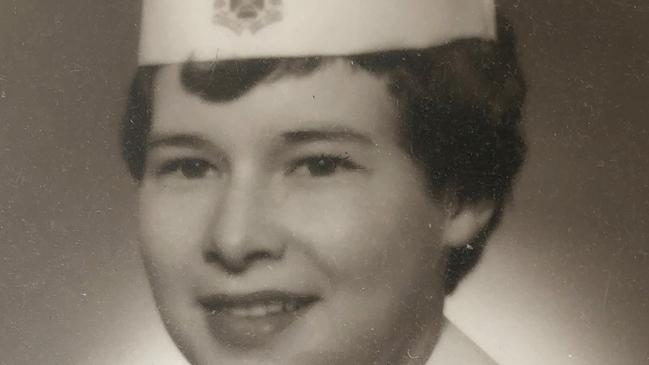
Hunt vividly remembers what his mate said all those years ago.
“She drove the car through the double doors – she’s parked inside the Year 12 centre!”
“All I did was said, ‘OK, I’ll just grab my bag’. I left my bike there”.
“Hi mum,’’ Hunt said when he got to the car. “Good of you to pick me up. And we didn’t say anything about it. Just treated it like there was nothing usual.”
But surely he realised it was unusual to be chased around the kitchen table with a knife? Hunt can’t recall what sparked it, but laughs, saying he probably deserved it.
“She was laughing at the time. It was sort of funny with a bit of an edge, (and I was thinking) I better keep moving. I’m not going to test out being caught.”
Asked if he told his dad. Hunt said, “I doubt it”, adding he didn’t tell on people.
500 TEXTS A DAY
Hunt is always across his detail and works at serious policy reform.
Before he showed his stamina and judgment in helping steer Australia through the initial phase of COVID-19, it was Hunt’s commitment to mental health that impressed so many in the medical sector and his backbench.
His childhood is the backstory to his success and it explains in part why he is dedicated and in tune to mental health funding and reform.
All but one interview with The Sunday Mail was done months before coronavirus infected the world and snuffed out the global economy. He would jokingly call the interviews his “therapy sessions”. But Hunt did them to explain that in some small way he can understand what some families go through.
“We are all a product of our childhood,’’ Hunt says when asked if his upbringing had helped him deal with COVID-19, the greatest challenge of his working life.
“Mum taught me empathy and the need for caring.”
He said his dad shaped his sense of public service, planning and understanding risk. Because of the pandemic, Hunt fields about 500 texts a day. His days start while stars can still be seen in the sky. Those days have been rolling into one for months.
He’s tired, yet Hunt, a policy wonk at heart, is in his element. Almost every day he runs to help clear his head.
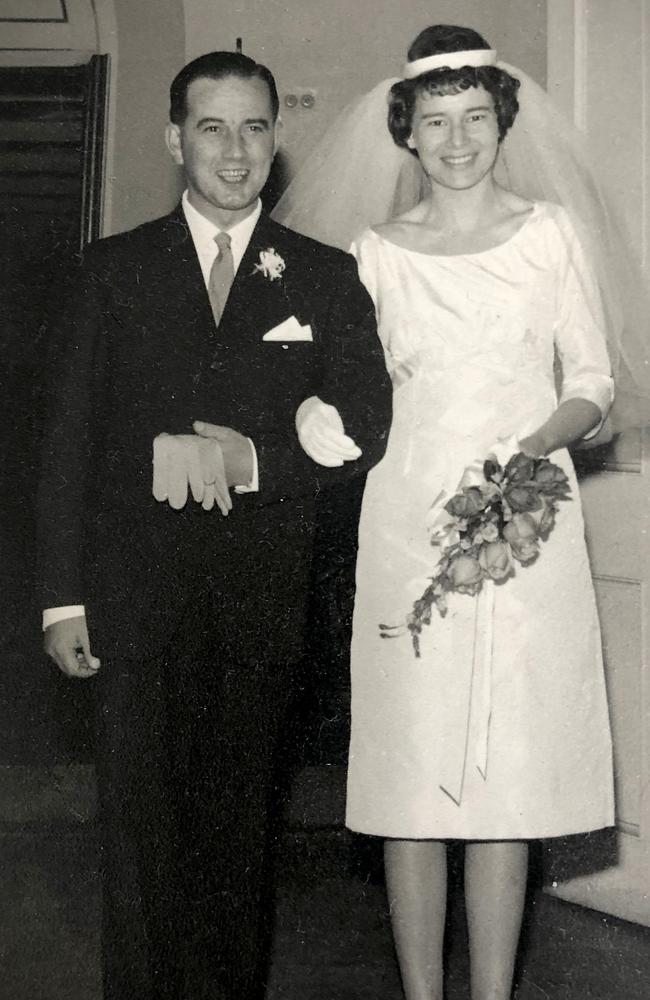
LID ON THE COT
In Canberra, information is currency and it is regularly traded over too many bottles of wine.
Hunt doesn’t wine and dine journalists or colleagues. He doesn’t drink at all during work functions or when parliament sits. While his colleagues race to build relationships after Parliament’s bells release them from the Hill, Hunt is all but reclusive, receiving briefings from his department, or clears his mind by exercising.
In the corridors way before coronavirus emptied out Parliament House, I ask him whether he heard the gossip doing the rounds: that a Liberal MP, who was allegedly unfaithful, supposedly had his suits strewn on his front lawn and mowed over by his wife.
Hunt, raises his eyebrows, and says, “Oh I haven’t heard that,” showing he is not interested in the story that has wet so many lips, and then begins relaying a policy he is working on.
To the Health Minister who has no problem remembering the trade names of hundreds of tongue-twisting drugs listed on the Pharmaceutical Benefits Scheme, it is scandalous hearsay that is irrelevant to his job. His ability to retain information is extraordinary and noted among his colleagues. His earliest memory? “I remember being in the cot. I was a climber and a walker. It wouldn’t pass the test these day; I had a lid (over the cot) that was locked down to prevent me from climbing out, with chicken wire on it so I couldn’t get out of the cot,’’ he said. “I must have been about 18 months old.”
But it is this trait of locking himself away to work – plus the ruthlessness of factional politics – that leaves Hunt a polarising figure among his colleagues. He has never got on with the Peter Costello clique.
The 2018 leaks about Hunt’s foul-mouthed tirade against a Northern Territory grandmother, who he later apologised too, were most likely pushed by the factional adversaries of Hunt, who was then environment minister. If the motive was to damage Hunt, it has long been forgotten.
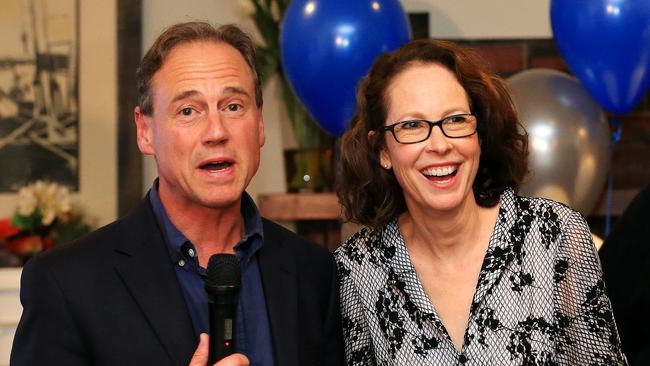
Hunt, who is frequently told by colleagues and the public the horror stories of eating disorders, depression, suicide, and drug use, knows what real challenges are.
As he relays the story of the death of his mother and father, he becomes overwhelmed with emotion.
They never saw him become the strong, political powerhouse he is today. But it’s not about that.
“You just miss them,” he says.
Hunt was in the US at Yale on a scholarship studying international relations and human rights when his mother died from a heart attack. At that time she was out of the institution. She was just 58 and he was 27. His last contact with her was in an institution.
“That was really confronting for me because she was on lithium, which I never want to see anyone on I know or anybody else on lithium because it’s not like the drugs they have now,’’ he said.
LEGACY
His dad was 85 years when he died. Just before his death, Hunt Jr was called to the nursing home, where he would visit him every few days.
Battling a respiratory infection, the doctors started talking about the potential for Hunt Sr to have a feeding tube. “I realised the doctors were there for me, not for him,” he said.
Hunt Sr would not have a bar of it. He would go into palliative care, knowing he would die within a week.
Ironically, he could make that decision because of a controversial decision he made years earlier.
The Victorian Medical Treatment Act 1988 allowed the right to refuse treatment. It passed because Hunt Sr exercised a conscience vote – abstained from voting at points during the debate – enabling the legislation to pass.
“His final lesson was not how to live but how to die,’’ his proud son says, whose legacy – of helping Australia escape the tsunami of coronavirus cases that are flooding other countries – will also be consigned to the history books.


